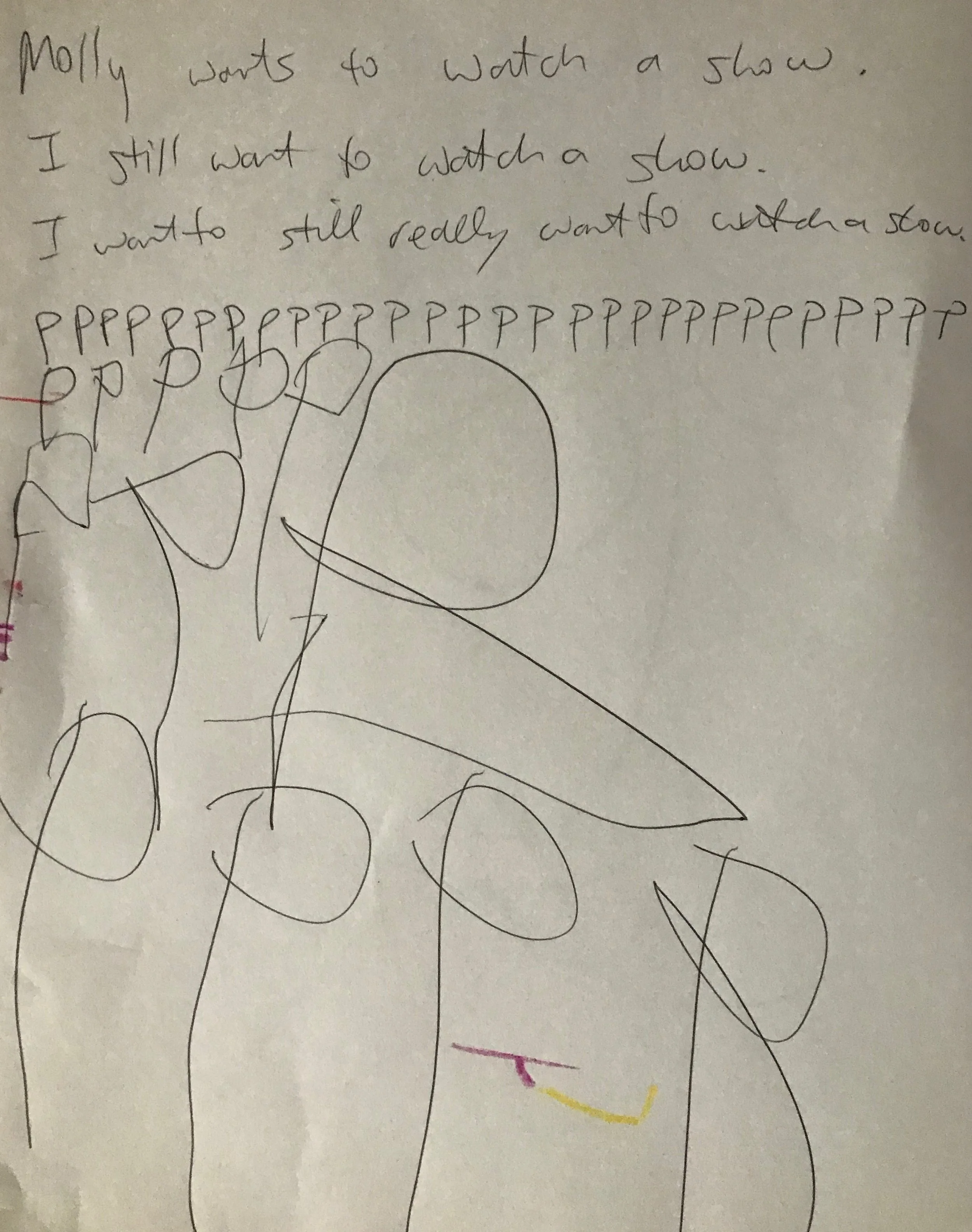Dictated, not read: The power of note-taking to help small children move on
Given that so much of my work as a therapist involves coaching parents and helping them navigate tricky situations with their children, you'd think I'd be totally adept at navigating them myself. Some of my clients assume this, and gaze in wonder when I tell them I'm just as human as anyone else. Sometimes it's only because I've been working with a client on a particular subject that I'm able to remember to put it into practice with my own family.
Case in point, the Sunday night free-for-all.
It's the end of a jam-packed weekend, my husband is out at yoga, and I'm juggling both kids solo through the witching hour and its accompanying parade of dinner, bath time, and bedtime prep. My 4 year old communicates to me that she isn't okay with this scenario in a variety of ways. Last week she did this was by saying "POO POO BUTT" over and over again, to the point where NO OTHER WORDS LEFT HER MOUTH for a good half hour. I tried my best to be patient and ignore those words (knowing that their very purpose was to harness my attention), but found myself really wanting to get punitive, and even told her that daddy and I would consider issuing a consequence of no after-dinner treats if she continued to have a hard time stopping herself from saying the offending phrase.
This week, daddy's departure for yoga was met with a similar sentiment, but expressed differently. "I WANNA WATCH A SHOW" was this week's cattle prod. I found myself getting similarly ruffled and riled as last week, felt the pull of an impending power struggle.
And then I remembered my clients.
In the past week, I've conducted two workshops using improv to help parents be flexible, responsive, present, and playful with their children. I've also met with a few parenting clients. In all situations, I've shared the following technique:
If you really want your child to feel heard, take notes. Take it seriously and write down everything they say.
This may seem counterintuitive at first - Rebekka, don't we want them to STOP saying the thing? Paradoxically, whether you're dealing with adults or children, the first step in helping someone move on and adopt a cooperative mindset is listening to them until they feel good and listened to. InThe Happiest Toddler on the Block, Dr. Harvey Karp calls this the "fast food rule;" when you go to order fast food, the first thing they do is repeat your order back to you. In Never Split the Difference, career FBI hostage negotiator Chris Voss calls this deploying tactical empathy.
There are many ways to slow down and demonstrate that you are really hearing your counterpart, but the note-taking is an easy hack. Although there are many possibilities for this technique, it can be done to document and show that you are hearing your child's:
Grievances - I want to eat cookies for dinner! It's not fair that I have to share a room with my brother!
Suggestions/solutions - My sister and I can take turns using the special tea set. When I'm feeling like throwing, I can toss beanbags into the cozy corner.
Requests - Can we read more books at bedtime? Could we get a puppy?
In this instance, it was mainly grievances. And as you can see from our list, what was beneath the grievance was really a request for silliness and connection:
After three iterations of her grievance, when Molly was clear that I was paying attention to--and writing down--her every word, she started experimenting. Will mommy listen and write it down if I make raspberry sounds? Yes, she will! How do we write raspberries? With lots of P's! Pretty soon, she wanted to be the note taker, and started writing down her own raspberry noises. Eventually she grabbed another piece of paper and started drawing a picture.
And there was not a single. Other. Request. To watch shows that evening.
And if I hadn't been helping others navigate situations like these with humor and kindness, my daughter and I might have gotten stuck again. I owe so much thanks to the people who trust me to help them navigate this business of raising children. I hope that I have helped them as much as working with them has helped me.
Rebekka Helford is a licensed marriage and family therapist in private practice in Los Angeles, California. With over a decade of experience working with parents and young children, Rebekka specializes in short-term intensive parenting consultation, using a variety of tools including home, office, and school visits to help families navigate developmental hiccups and get back on track. Virtual visits now available!
Click here to schedule an appointment or contact Rebekka with a question – who knows, she might even answer it in her next post!



